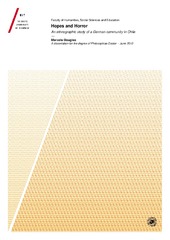| dc.contributor.advisor | Nergård, Jens Ivar | |
| dc.contributor.author | Douglas, Marcela | |
| dc.date.accessioned | 2014-02-03T12:31:21Z | |
| dc.date.available | 2014-02-03T12:31:21Z | |
| dc.date.issued | 2014-02-21 | |
| dc.description.abstract | The theme of the thesis is an exploration of how an utopian community can develop into totalitarianism, exemplified by a German religious community, formed after World War II, that emigrated to Chile in the early 1960-ies and gradually changed under the impact of political changes in Chile from the 1970-ies until today.
The problem is to explore how this development was brought about by the interplay between external factors – sentiments, ideologies and political conditions in the societies involved (Germany and Chile) – and internal factors – leadership psychology, organizational structure, values and beliefs, disciplinary methods, creation of a common narrative, methods for fostering loyalty, enthusiasm etc.
The main theory used is derived from Hanna Arendt`s studies of totalitarianism and the research literature following this tradition.
The research method is anthropological field work. The material is obtained through open interviews with informants from three generations of community members. Video recordings is used both as a medium for establishing trust between researcher and informants, and as documentation in its own right.
What the research process revealed was how mind control of the community members was executed through a penumbra of means, first of all through dissolution of normal family relations. Rigid roles for separate groups: men and women, small children, bigger children, teenagers, were important. Penal codes for misbehaviour, secrecy about the different disciplinary measures and systematic use of incriminating information about individuals, by the leadership group, was also part of this. A regime of hard physical labour, propagandistic use of cultural events and campaigns, and a strictly negative attitude towards intellectual interest and information about the world also contributed. | en |
| dc.description.doctoraltype | ph.d. | en |
| dc.description.popularabstract | Tema i avhandlingen er en utforsking av hvordan et utopisk samfunn kan utvikle seg til et totalitært, eksemplifisert gjennom et tysk religiøst samfunn, dannet etter andre verdenskrig, som emigrerte til Chile i begynnelsen av 1960-tallet og gradvis endret seg i takt med politiske enderinger i Chile fra 1970-tallet og frem til i dag.
Avhandlingen utforsker hvordan denne utviklingen gikk til ved å se på samspillet mellom eksterne faktorer – følelser, ideologier og politiske forhold i involverte samfunn (Tyskland og Chile) – og interne forhold - lederskap, psykologi, organisasjonsstruktur, verdier og tro, disiplinære metoder, skapelsen av en felles historie, metoder for å skape lojalitet.
Hovedteorien som er brukt er hentet fra Hanna Arendt sine studier av totalitarisme, og forskningslitteratur som følger denne tradisjonen.
Forskningsmetoden er antropologisk feltarbeid. Datamateriale er oppnådd gjennom åpne intervjuer og samtaler med informanter fra tre generasjoner. Videokamera er brukt både som en måte å skape tillitt mellom forsker og informanter, og som dokumentasjon. | en |
| dc.identifier.uri | https://hdl.handle.net/10037/5810 | |
| dc.identifier.urn | URN:NBN:no-uit_munin_5509 | |
| dc.language.iso | eng | en |
| dc.publisher | UiT Norges arktiske universitet | en |
| dc.publisher | UiT The Arctic University of Norway | en |
| dc.rights.accessRights | openAccess | |
| dc.rights.holder | Copyright 2014 The Author(s) | |
| dc.rights.uri | https://creativecommons.org/licenses/by-nc-sa/3.0 | en_US |
| dc.rights | Attribution-NonCommercial-ShareAlike 3.0 Unported (CC BY-NC-SA 3.0) | en_US |
| dc.subject | VDP::Samfunnsvitenskap: 200::Sosialantropologi: 250 | en |
| dc.subject | VDP::Social science: 200::Social anthropology: 250 | en |
| dc.subject | VDP::Samfunnsvitenskap: 200::Pedagogiske fag: 280 | en |
| dc.subject | VDP::Social science: 200::Education: 280 | en |
| dc.subject | VDP::Humaniora: 000::Filosofiske fag: 160 | en |
| dc.subject | VDP::Humanities: 000::Philosophical disciplines: 160 | en |
| dc.subject | VDP::Samfunnsvitenskap: 200::Medievitenskap og journalistikk: 310 | en |
| dc.subject | VDP::Social science: 200::Media science and journalism: 310 | en |
| dc.title | Hopes and Horror - An ethnographic study of a German community in Chile | en |
| dc.type | Doctoral thesis | en |
| dc.type | Doktorgradsavhandling | en |


 English
English norsk
norsk
